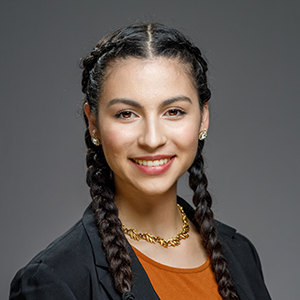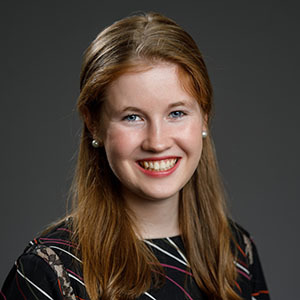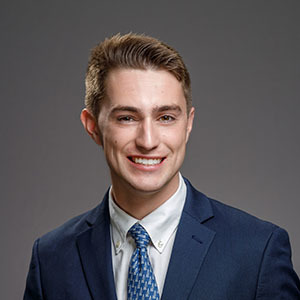For many Notre Dame students, the idea of summer “vacation” is a relic of the past, even during a pandemic. June, July, and August provide a valuable chance for students to pursue research opportunities, volunteer at nonprofits, or work relationship-building internships. COVID-19 challenged many scholars to take these opportunities online or coordinate new arrangements altogether; however, they still found unique ways to put their talents to use and continue molding their future careers through summer experiences.
Mariana Silva — Class of 2021, Brennan Scholar

Mariana Silva, a Brennan Scholar, planned to spend her summer in Quito, Ecuador, volunteering through Notre Dame’s International Summer Service Learning Program (ISSLP) working on public health and community well-being projects in the country. When the pandemic forced the Center for Social Concerns to cancel the ISSLPs, she found herself bored and restless in her Maryland bedroom with nothing on her agenda for the entire summer.
“I was very driven just by my desire to be useful,” Mariana said. “I was like, ‘I have an engineering brain and resources at my fingertips...I could definitely help somebody out somewhere.’”
She started researching NGOs and environmental groups all over the world, looking for projects that interested her. When she came across an organization based in the Netherlands called Wetlands International, she cold-emailed their default admin address, expressing interest in their work and asking if they needed an extra hand in any way.
They did. Wetlands International wrote back to her a few days later saying they would love to have her on the team. Starting in June for 10-20 hours a week, Mariana was laying virtual groundwork for their Building with Nature Asia initiative dedicated to restoring 15 wetland sites throughout Indonesia, Philippines, India, Malaysia, and China. The team’s goal was to tackle the restoration efforts through an environmental engineering framework, giving the wetlands a community function or livability purpose beyond the environmental interest.
Throughout the summer, Mariana’s job was to take the full list of Asian wetlands sites the organization was considering, dig through Google results, academic papers, and news articles to construct profiles of these sites, and finally help the team decide which sites would be most feasible from an environmental and stakeholder standpoint.
“Once I was seeing the sites get narrowed down, it was just really fun because I was seeing a project progress from an earlier stage that I had been involved with and now a later stage that I’m still involved with,” she said. “I was able to actually within a short period of time see the effects of my contributions, which is cool.”
Mariana knows her hours spent with Wetlands International were well-spent, quality time that changed her perspective of what opportunities are available in her field.
“I don’t think I would’ve considered working for a company halfway across the world if I hadn’t been sitting at home with a lot of time on my hands to be researching these different wetland-related projects, so I’m grateful for the virtual work because I was able to just broaden my view of what’s in my field beyond just what might be in the United States.”
Greta Rauch — Class of 2022, Stamps Scholar

After interning for two summers at a tech startup in Chicago, Stamps Scholar Greta Rauch decided to widen her job search on Handshake, Notre Dame’s career-search platform. She applied to the first thing that stuck out to her – an internship at Microsoft – and after a phone interview, she was offered the job. At the time, Greta was excited to explore Seattle during the summer of 2020, but realized this may not be possible as the pandemic worsened. Thankfully, Microsoft was very communicative and assured Greta and the other interns that they would still have their internships, whether virtual or in-person.
“The work was really exciting and challenged me technically,” Greta said. She was working virtually on Microsoft Teams, which she describes as a “one-stop shop for work productivity,” which includes email, calendars, video chat, and more. The interns were invited to virtual happy hours, coworker chats, and conferences with higher-ups in the company. Despite the efforts to engage, though, Greta felt that there was something missing by not being in person.
“I learned how to be successful and communicative virtually, and how to work on collaborative projects when you can’t be in the same room,” Greta said. “I can see companies continuing to utilize virtual work, but not for summer internships. The in-person piece is so important, and while they had a fabulous virtual program, having all the interns in one spot would be a preference.”
It was challenging to build community, she said, but there were some unique opportunities along the way as well. For instance, Greta and her team spoke to a Microsoft researcher working in China on building translation systems, which was especially fascinating as a Computer Science and Chinese double major. They also were able to do a live demo, rather than a prerecorded one, for their manager.
“It was great to be so confident in the code we had written that we were ready to run successfully, even when we’d all been working remotely,” she said.
Greta was also able to use the virtual internship experience to help her discern what she wants to do after graduation. While she found software development work very engaging, Greta hopes to focus more on research and education opportunities in the computer science field.
Billy Porter — Class of 2022, Hesburgh-Yusko Scholar

For Billy Porter, a junior Hesburgh-Yusko Scholar, working virtually as a Google intern meant that he wouldn’t be able to experience Google’s famed colorful, hammock-lined, ping-pong-filled offices first-hand. But he still found ways to make his summer experience enriching, even if over Zoom.
After years of working on campus as a deep-learning researcher and analyst in cancer research labs, Billy set his internship sights on Silicon Valley. He reached out to former Hesburgh-Yusko scholars at Google using the Notre Dame Scholars’ Program alumni database and was soon hired as a STEP Intern for Summer 2020. He was originally slated to join a machine-learning team working on Google’s targeted advertising practice; however, once the internship was made virtual, he was shifted to a more general web-development internship for company confidentiality reasons.
Billy spent the first six weeks of his time at Google working through a variety of tutorials and projects to get comfortable with Google’s web development platforms. He was then put on a team with two other interns to build a web application from the ground up, proposing designs to Google engineers and spending hours writing, reviewing, and testing code.
“I was surprised in the sense that I found myself able to focus for the entire day without distraction [and] without procrastinating,” Billy said. “I think some good steps I took were purchasing a new desk, getting a new monitor, really kind of upgrading my work-from-home setup so it didn’t really feel so much like home but more like a work environment.”
However, despite being a very capable virtual worker, Billy knows there are some aspects of the internship experience that did not translate well to video conferences.
“I definitely missed out on a lot of the connections you form,” he added. “I know a lot of names [and] have a lot more LinkedIn connections now, but I don’t think those are genuine connections, people who will really vouch for me and that I feel pretty close to.”
Another issue Billy ran into was figuring out how to mentally separate work-life from home-life in the COVID-era.
“It was actually a really big problem for me: being able to just kind of unplug,” he said. “When I finished work, I’d go downstairs and go to my family room. It felt like I was still at work. My mind was still racing with work. I still had emails and chats on my phone...It would take me a couple hours after work ended just to be able to feel like I can relax and feel like I was home again.”
Billy will likely be returning to Google next summer to continue his work, although Google has already announced all summer 2021 internships will be virtual. He hopes Google will use the additional preparation time to explore better virtual engagement opportunities for employees and implement the security infrastructure necessary to let interns remain on their originally slotted teams this summer.